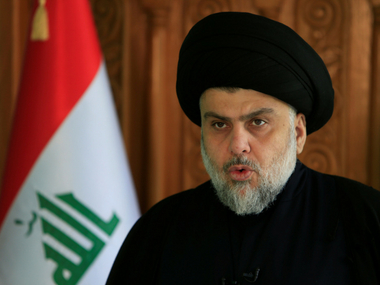Najaf: Iraqi prime minister Haider al-Abadi and nationalist cleric Muqtada Sadr on Saturday said they had formed an alliance in a bid to create a new government after May polls. Sadr’s joint list with communists won 54 seats in the legislative elections to become the biggest bloc in Iraq’s 329-seat parliament, while Abadi’s bloc came in third, scooping just 42 seats. On Saturday Abadi travelled to the Shiite shrine city of Najaf to meet Sadr. [caption id=“attachment_4581201” align=“alignleft” width=“380”] File image of Muqtada-al Sadr. Reuters[/caption] After three hours of talks they issued a joint statement announcing they had set up a coalition. The statement said their alliance “transcends sectarianism and ethnic” issues “in order to speed up the formation of the new government and agree on the principles which serve the aspirations of our people”. A source close to Sadr’s Marching Towards Reform alliance said the thorniest issue is who will fill the post of prime minister in the new government. Abadi would like to keep the job but is meeting resistance from rivals who beat his bloc in the election. Saturday’s joint statement did not mention an alliance Sadr formed earlier in June with two other lists, ahead of a manual recount ordered by Iraq’s supreme court amid allegations of fraud. The previous week, the firebrand Sadr, a former militia leader, reached a coalition agreement with the pro-Iranian former fighters under Hadi al-Ameri, whose list came second in the election with 47 seats. Before that, Sadr formed an alliance with Shiite Ammar al-Hakim’s Al-Hikma list, which won 19 seats, and the secular outgoing vice-president Iyad Allawi, whose list was comprised largely of Sunnis and secured 21 seats.
Iraq prime minister Haider-al Abadi on Saturday travelled Najaf to meet Shia politician Moqtada Sadr, announcing an alliance to form a new government after May polls.
Advertisement
End of Article


)

)
)
)
)
)
)
)
)



